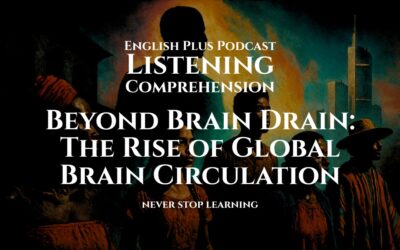Listen | Mental Health Awareness
Listening Comprehension Quiz
Transcript: Please don’t check the transcript before you listen and take the quiz.
Hello everyone! Today, we’re diving into a topic that is absolutely crucial but often overlooked: mental health awareness. Now, I know mental health can sometimes feel like a heavy subject, but it’s one we all need to talk about. After all, taking care of our mental well-being is just as important as taking care of our physical health. So, let’s explore what mental health is all about, why it matters, and how we can all take steps to nurture it.
First off, let’s define mental health. When we talk about mental health, we’re referring to our emotional, psychological, and social well-being. It’s about how we think, feel, and behave in our daily lives. Just like physical health, mental health can fluctuate—some days you might feel on top of the world, while other days can be a bit more challenging. And that’s completely normal! The key is recognizing when those challenging days start to become more frequent and taking steps to address them.
One of the biggest misconceptions about mental health is that it only concerns people who have mental illnesses. But that’s not true at all! Mental health affects everyone. You don’t need to be diagnosed with depression or anxiety to benefit from paying attention to your mental well-being. In fact, everyone experiences stress, sadness, or anxiety from time to time. It’s part of being human. The important thing is to be aware of how you’re feeling and to take action if you notice that your mental health is suffering.
So, how do we take care of our mental health? There are a lot of ways to nurture your mind and keep it healthy. One of the most important things you can do is to stay connected with others. Humans are social creatures by nature, and having a strong support system can make a huge difference in your mental well-being. Whether it’s talking to a friend, joining a club, or simply spending time with loved ones, maintaining those connections can help you feel supported and understood.
Another key aspect of mental health is managing stress. We all deal with stress—it’s just a part of life. But how we handle it can make a big difference in our mental health. Finding healthy ways to cope with stress is crucial. This could be through exercise, meditation, journaling, or even just taking a few deep breaths when things get overwhelming. The goal is to find what works for you and make it a regular part of your routine.
Let’s also talk about the importance of self-care. You’ve probably heard this term thrown around a lot, but what does it really mean? Self-care is all about taking time to do things that make you feel good, both physically and mentally. This could be anything from taking a relaxing bath to pursuing a hobby you love. The key is to make self-care a priority, not an afterthought. When you take care of yourself, you’re better equipped to handle life’s challenges.
Now, let’s address the stigma around mental health. Unfortunately, there’s still a lot of misunderstanding and judgment when it comes to mental health issues. Some people may feel embarrassed or ashamed to talk about their struggles, which can make it harder to seek help. But the truth is, seeking help is a sign of strength, not weakness. Whether it’s talking to a therapist, counselor, or even a trusted friend, reaching out when you’re struggling is one of the most important steps you can take for your mental health.
Speaking of help, let’s not forget the importance of professional support. Sometimes, self-care and talking to friends aren’t enough, and that’s okay. There’s no shame in seeking professional help when you need it. Therapists and counselors are trained to help you navigate difficult emotions and develop strategies for managing your mental health. It’s just like going to the doctor when you’re physically unwell—it’s a way to take care of yourself.
In conclusion, mental health awareness is about recognizing that mental well-being is a vital part of our lives. It’s about understanding that it’s okay to not be okay sometimes and that help is available when you need it. By staying connected with others, managing stress, practicing self-care, and seeking professional help when necessary, we can all take steps to nurture our mental health. So, let’s keep the conversation going and continue to break down the stigma around mental health. After all, a healthy mind is just as important as a healthy body.
Expand Your Vocabulary
- Mental Health:
Meaning: The state of your emotional, psychological, and social well-being.
In Context: In the lecture, mental health is described as how we think, feel, and behave in our daily lives.
Everyday Use: “Taking care of your mental health is just as important as staying physically active.” - Well-being:
Meaning: The state of being comfortable, healthy, or happy.
In Context: The lecture discusses how mental health affects our overall well-being, including how we feel and function.
Everyday Use: “Regular exercise and a balanced diet contribute to your overall well-being.” - Stigma:
Meaning: A mark of disgrace or negative judgment associated with a particular circumstance, quality, or person.
In Context: The lecture addresses the stigma around mental health, which can prevent people from seeking help.
Everyday Use: “There’s still a lot of stigma around discussing mental health openly, but that’s changing.” - Self-care:
Meaning: The practice of taking action to preserve or improve one’s own health, particularly mental health.
In Context: The lecture emphasizes the importance of self-care, which involves doing things that make you feel good mentally and physically.
Everyday Use: “I prioritize self-care by setting aside time for activities that relax and recharge me.” - Support system:
Meaning: A network of people who provide practical or emotional support.
In Context: The lecture highlights the importance of having a strong support system to maintain mental well-being.
Everyday Use: “Having a good support system of friends and family can make a big difference during tough times.” - Coping mechanisms:
Meaning: Strategies or behaviors that people use to manage stress or difficult emotions.
In Context: The lecture suggests finding healthy coping mechanisms, like exercise or meditation, to manage stress.
Everyday Use: “One of my coping mechanisms for stress is going for a run to clear my mind.” - Professional help:
Meaning: Assistance provided by a trained expert, such as a therapist or counselor, to address mental health issues.
In Context: The lecture encourages seeking professional help when needed, viewing it as a sign of strength.
Everyday Use: “I decided to seek professional help from a therapist when I was feeling overwhelmed.” - Therapist:
Meaning: A trained professional who provides treatment for mental or emotional problems.
In Context: The lecture mentions that therapists can help you navigate difficult emotions and manage your mental health.
Everyday Use: “Talking to a therapist has helped me develop better strategies for dealing with stress.” - Mindfulness:
Meaning: The practice of being aware and present in the moment, often used as a technique to reduce stress.
In Context: Although not directly mentioned in the lecture, mindfulness is a common practice for managing stress and improving mental health.
Everyday Use: “I’ve started practicing mindfulness to help stay calm and focused throughout the day.” - Emotional well-being:
Meaning: The ability to manage your emotions and express them appropriately, which contributes to your overall mental health.
In Context: The lecture refers to emotional well-being as a key component of mental health, affecting how we respond to life’s challenges.
Everyday Use: “Maintaining emotional well-being is important for both personal relationships and mental health.”
Vocabulary Quiz
Let’s Talk
- Mental Health Awareness: How has your understanding of mental health changed over the years? Do you think society is doing enough to promote mental health awareness?
- Breaking the Stigma: Have you ever encountered stigma related to mental health, either personally or in others? What can be done to reduce this stigma and encourage open conversations?
- Self-Care Practices: What are some self-care practices you engage in regularly? How do these practices help you maintain your mental well-being?
- Support Systems: Do you have a strong support system in your life? How do you rely on friends and family for emotional support, and how do you offer support to others?
- Managing Stress: What are your go-to coping mechanisms when you’re feeling stressed or overwhelmed? Have you found certain techniques more effective than others?
- Seeking Professional Help: Have you or someone you know ever sought professional help for mental health? How did it impact your view of mental health and the importance of seeking assistance when needed?
- Mindfulness and Mental Health: How do you incorporate mindfulness or other relaxation techniques into your daily routine? Have you noticed a difference in your stress levels or overall well-being?
- Balancing Physical and Mental Health: How do you balance taking care of both your physical and mental health? Do you find that improvements in one area positively affect the other?
- Overcoming Challenges: What are some challenges you’ve faced in maintaining your mental health, and how did you overcome them? What advice would you give to others who may be struggling?
- Building Resilience: How do you build resilience in your daily life? What role does mental health play in helping you bounce back from difficult situations?
Feel free to share your thoughts in the comments or discuss these questions with your friends and family. Reflecting on these ideas can deepen your understanding of mental health and help foster more open and supportive conversations.










0 Comments